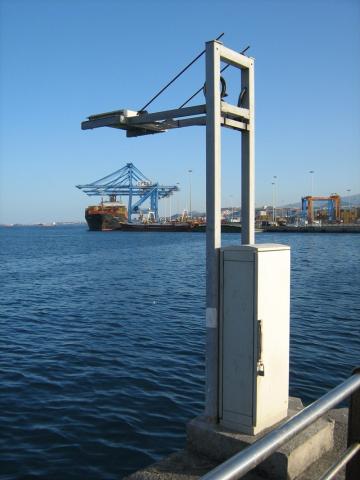
Puertos del Estado to Assess Climate Change Risks in the Spanish Port System
• The Environmental Hydraulics Institute Foundation of Cantabria will carry out the work, which includes developing a parameterized risk analysis tool for Spanish ports.
• The results will contribute to designing climate change adaptation plans for ports based on consistent data sources and methodologies, as well as to the development of the future Port Observatory for Climate Change.
06-10-2025 (Puertos del Estado). Puertos del Estado has awarded the Environmental Hydraulics Institute Foundation of Cantabria a contract to conduct a preliminary climate risk assessment for the 46 ports of general interest, which will include the development and implementation of a dedicated analytical tool. The results will support the design of port climate change adaptation plans based on harmonized data sources and methodologies and will contribute to the development of the future Port Observatory for Climate Change. All planned developments will be coordinated through a dedicated working group with the Port Authorities. The contract value amounts to €650,000.
Among the objectives pursued is ensuring methodological consistency both internally—within the port system—and externally, in alignment with other institutions, particularly the Ministry for the Ecological Transition and the Demographic Challenge (MITERD) in the case of coastal risk analyses, and the Intergovernmental Panel on Climate Change (IPCC). The project will also facilitate the monitoring and updating of climate risks within the framework of the Business Plans agreed with the Port Authorities.
This preliminary assessment will provide an initial risk characterization (high–medium–low) and identify those ports where higher-resolution analyses, to be undertaken by each Port Authority, should be prioritized. It will also enable an initial estimation of adaptation measures and associated costs.
This initiative, promoted by Puertos del Estado for the entire port system, represents a decisive step within the Strategic Framework to address climate change adaptation. It complements the significant contributions and investment efforts already being made by the ports in the field of mitigation, notably through the deployment of Onshore Power Supply (OPS) systems—allowing berthed ships to switch off their auxiliary engines and thereby reduce emissions.
This work is part of the objectives set out in the Spanish Government’s Second National Climate Change Adaptation Plan (2021–2030), which assigns to the Port System of General Interest the task of systematically incorporating climate risk assessments into decision-making processes affecting critical national infrastructure such as ports. In doing so, Puertos del Estado will contribute to providing a nationwide perspective on climate risks, helping to identify the ports at greatest risk and therefore most in need of priority action.
As a starting point, Puertos del Estado will provide its Operational Oceanography Service, developed over the past 30 years and internationally recognized as a leader in the field. This service measures, analyzes, and forecasts sea conditions (wave height, sea level, currents, etc.) using advanced numerical prediction systems and data from its ocean-meteorological monitoring networks: the deep-water buoy network (15 stations), the coastal buoy network (13 stations), the tide gauge network (41 sea-level and agitation stations along the Spanish coast), and a high-frequency radar network (9 stations jointly owned and operated with other institutions) for measuring surface currents. These networks transmit real-time data to Puertos del Estado, which manages, processes, and distributes the information.

